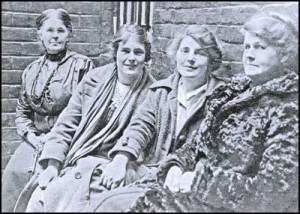The Friends of Alice Wheeldon
In 1917 a Derby socialist and feminist in the anti-war movement, Alice Wheeldon was sent to prison on the evidence of an agent provocateur for plotting to kill Lloyd George. The evidence was flimsy, her accuser so dubious the prosecution kept him away from the trial. In this new, revised edition of The Friends of Alice Wheeldon Sheila Rowbotham reveals how militarism and fears about security contrived to devastate the lives of an ordinary family in Derby. The Wheeldon case is both a tragic historical story and contains an immediate reminder for today of the need to protect individual freedoms.
Sheila Rowbotham’s books have been translated into many languages and her early works are currently being reissued as classic texts of feminism. She is an Honorary Fellow in Social Science at Manchester University. Her recent work includes Edward Carpenter: A Life of Liberty and Love (Verso, 2008) winner of the Lambda Literary Award for Gay Memoir/ Biography 2008 in the US and shortlisted for the James Tait Black Memorial Prize in the UK and Dreamers of a New Day: Women who Invented the Twentieth Century (Verso, 2010). She contributed ‘Alice Wheeldon Revisited’ to Mary Davis (ed.), Class and Gender in British Labour History (Merlin, 2011).

Bristol women campaigning for peace in World War One
June Hannam will focus on women in Bristol who opposed militarism and sought a negotiated peace. The most high profile activists were Mabel Tothill, Annie Townley and Mrs Higgins, all socialists from the Independent Labour Party (ILP). Others, such as the Quaker Helen Sturge, had been involved in the pre-war suffrage movement. The talk will explore what women did to push forward their cause and the ideas that underpinned their peace activism, in particular the extent to which they were gendered. Women used spaces that brought them together as women, notably the Women’s International league, but also worked through mixed sex organisations. It will be suggested that although peace campaigning could bring women together across class and party lines, for socialist women peace would lay the foundations for a new society that could only be achieved through party politics after the war.
June Hannam is Professor of Modern British History (Emerita) at UWE. Her research and publications have focused on feminist and socialist politics in the late nineteenth and early twentieth centuries. Publications include Isabella Ford, 1855-1924 (1989); with Karen Hunt, Socialist Women: 1880s-1920s (2002); Feminism (2012). She is chair of the West of England and South Wales Women’s History Network. She is currently working on a book with Madge Dresser, Peter Fleming and Moira Martin on the History of Women in Bristol from the medieval period to the present day. This meeting coincides with the publication by BRHG of June’s work on the ILP in Bristol during WW1 entitled Bristol Independent Labour Party: Men, Women and the Opposition to War.
Watch This Talk:
Let Them Eat Art
Send for the Womens Brigade!
http://www.redbubble.com/people/letthemeatart/works/12934790-womens-brigade